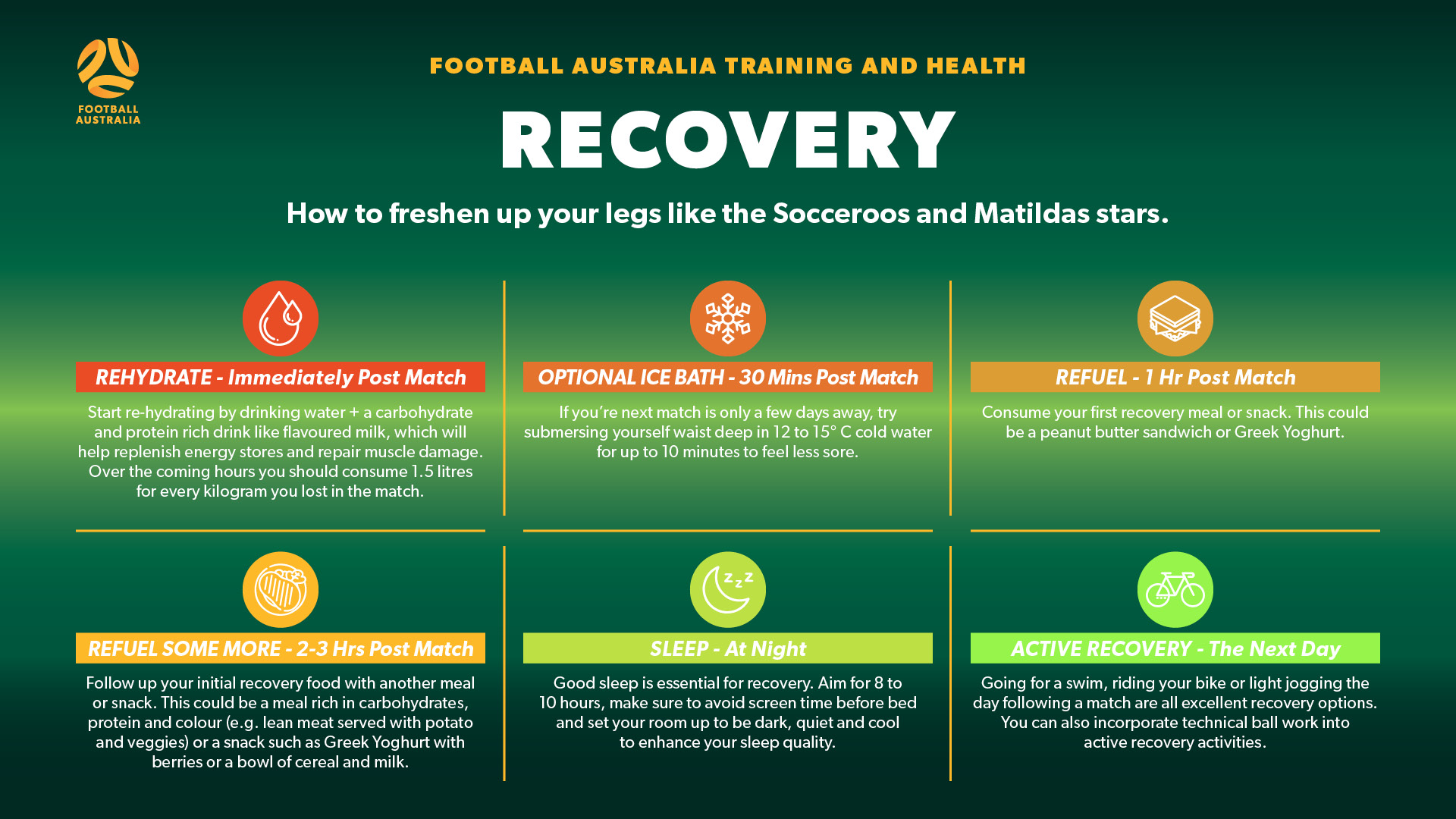RECOVERY
Football is a physically demanding sport. Matildas and Socceroos players often run over 11 kilometres per match, with high speed running (defined as over 20 km/h) contributing up to 10% of this distance.
Amateur and youth football is no different.
Individual fitness levels, playing style and playing position all dictate how much a player runs in a game, but research has shown that peak running intensities in Under 15s football (and older age groups) can match those typically encountered in professional football matches [1].
Regardless of how much ground you cover in a match, sprinting, changing direction, jumping and tackling all take great effort and can cause fatigue towards the end of and after your matches [2].
Select the drop-downs below to learn more about the mechanisms contributing to fatigue in football.
In hot and humid environments, players can easily lose up to 2% of their body mass (or 1.2kg for a player weighing 60kg) in fluid alone, which can contribute to fatigue. Even losses of less than 2% of body mass have been linked to impairments in endurance performance [2].
Our bodies use carbohydrates, stored as glycogen in our muscles and liver, to produce the energy we need to perform high intensity actions, such as sprinting, jumping and tackling. These glycogen stores can be depleted by the end of a match, potentially inhibiting high intensity actions [2].
Performing sprinting, changing direction, jumping and kicking actions repetitively can damage our muscles, particularly if we are not used to performing them for a full match (e.g. in early pre-season). This muscle damage is characterised by soreness, swelling and a temporary decrease in muscle function [2].
Playing football requires enormous concentration, as we continuously assess the movement of the ball, teammates and opponents. Over the course of a match, this can lead to mental fatigue, which may in turn affect physical performance [2].
Playing one match per week allows for plenty of time to recover and train hard between games. When matches are played less than four days apart, players may be unable to recover fully, which in turn inhibits performance and increases injury risk [3].
World Cup Qualifiers and international competitions always involve congested match and travel schedules. To compete at a high level from match to match it is extremely important our players maximise their recovery through smart training, good food and sleep and using all available recovery methods directed by our Sports Science team.
Graham Arnold, Socceroos Head Coach
How long it takes to recover fully depends on a multitude of factors and no two players are alike. Different aspects of recovery also have different timeframes. For example, recovering from dehydration is usually a matter of hours, while muscle soreness typically peaks 24 to 48 hours post-match and can still be felt up to 4 days after [2, 4].
The infographic below was created to help you combat the mechanisms of fatigue and speed up your recovery process.

Select the following dropdowns to learn more about how you can combat fatigue and maximise your recovery.
You should always start a match well hydrated. Sipping on water or sports drinks in the hours leading into a match and during the warm-up helps avoid excessive dehydration.
Current research advises to replace every litre of fluid lost during a match with 1.5 litres of fluids in the hours after a match [4, 5]. An easy way of figuring out how much fluid you lost is to step on a set of scales immediately before a match and immediately after a match (wearing minimal clothing) and then taking the difference. 1kg of weight lost requires 1.5L of fluid replacement in the hours after your match.
Depending on your needs, these fluids can come just from water or a combination of water alongside juice, sports drink or flavoured milk, to help start to replenish energy stores and aid muscle repair [4, 5].
Check out our Hydration section for more details on how to ensure you stay on top of your fluid levels.
Your body needs carbohydrates and protein to replenish energy stores and repair muscle damage [4, 5]. If you typically have low appetite after matches, you can start refuelling with carbohydrate and protein containing fluids first (e.g. flavoured milk or smoothies) and then follow this up with foods that are easy to eat and that you enjoy [4].
The quantities you should ingest depend on a variety of factors, including your weight and how strenuous the match was [4]. The suggestions below give you an outline of what your post-match refuelling could look like:
- 15-30 minutes post-match: consume a flavoured milk or other carbohydrate and protein rich recovery drink.
- 1 hour post-match: consume your first recovery meal or snack. This could be a full meal (as below) or a snack such as a peanut butter sandwich or Greek Yoghurt.
- 2-3 hours post-match: follow up your initial recovery food with another meal or snack. This could be a meal rich in carbohydrates, protein and colour (e.g. lean meat served with potato and veggies or a wrap filled with lean meat and salad) or a snack such as Greek Yoghurt with berries, a bowl of cereal and milk, or some toast.
Check out our Nutrition section for more details on how to eat to fuel performance and recovery.
Good sleep is essential for recovery. A lack of sleep impairs our ability to learn and form new memories, it decreases our mental wellbeing and disrupts growth and cell repair [6]. Inadequate sleep also decreases our resistance to respiratory viruses [6] and has been associated with a multitude of performance decrements [6, 7].
Research suggests that 7 to 9 hours of sleep per night is adequate for adults, while adolescents need between 8 to 10 hours [6]. As an athlete, you should aim for the higher end of this scale to get the most benefit out of your sleep.
To maximise your sleep, try following these tips from researchers at the University of California San Diego [7]:
- Do not go to bed until you are sleepy. Do not stay in bed if you cannot sleep but do something else until you feel sleepy.
- Follow bedtime routines like reading or having a bath to prepare your body for bed.
- Aim to get up at the same time every day, including weekends.
- Try to get a full night’s sleep every night and limit naps to less than an hour (avoid them altogether after 3 PM).
- Do not use mobile phones, tablets or laptops in bed. Try to use your bed for sleeping only.
- Avoid caffeine (coffees and energy drinks), especially after lunch.
- Avoid high intensity exercise shortly before bed.
- Set up your bedroom to be as quiet and dark as possible. Cooler temperatures are preferable to warmer temperatures for good sleep.
Active recovery is widely popular in football and may help your body recover quicker, although there is no clear evidence to justify its use [8]. Active recovery can be anything you enjoy doing, from a swim in a pool or the ocean to a leisurely bike ride or just a slow jog on the pitch, but it should last at least 15 minutes and avoid all high intensity actions (such as sprinting). It is best to avoid active recovery immediately after a match, as this might negatively affect our ability to replenish our energy stores [5, 8]. Try completing active recovery sessions on the morning or afternoon following a match.
Ice baths are a controversial topic in sports science and it is still unclear how, and even if, they help to restore players’ performance levels quicker. However, research suggests that most players report feeling better after using ice baths [5, 8], which explains why most professional teams in the world utilise them.
If you are keen to try an ice bath yourself, submerse yourself below waist height in water that is between 12 and 15 degrees Celsius. Aim to stay in for 10 minutes but jump out if it becomes too uncomfortable.
Be aware that the use of ice baths can potentially hinder your training adaptations [5], so try to avoid them in pre-season.
Despite its incredible popularity across all levels of football, there is no substantial evidence to suggest that stretching helps reduce muscle soreness or any other markers of fatigue [5, 8]. Stretching may still be utilised to train flexibility and range of motion.
Suggested Reading
- The Aspetar Sports Medicine Journal summarises research surrounding recovery strategies in football and provide a presentation by Gregory Dupont, Head of Performance for the 2018 World Cup winning French national team.
- If you enjoy reading books, Good to Go – How to Eat, Sleep and Rest Like a Champion, written by former professional cyclist Christie Aschwanden, summarises the science of recovery in a humorous and easy to understand way.
References
- L. H. P. Vieira, C. Carling, F. A. Barbieri, R. Aquino and P. R. P. Santiago, “Match Running Performance in Young Soccer Players: A Systematic Review,” Sports Med, vol. 49, no. 2, pp. 289-318, 2019.
- M. Nédélec, A. McCall, C. Carling, F. Legall, S. Berthoin and G. Dupont, “Recovery in Soccer Part I – Post-Match Fatigue and Time Course of Recovery,” Sports Med, vol. 42, no. 12, pp. 997-1015, 2012.
- H. Bengtsson, J. Ekstrand and M. Hägglund, “Muscle injury rates in professional football increase with fixture congestion: an 11-year follow-up of the UEFA Champions League injury study,” British journal of sports medicine, vol. 47, no. 12, pp. 743-747, 2013.
- M. K. Ranchordas, J. T. Dawson and M. Russell, “Practical nutritional recovery strategies for elite soccer players when limited time separates repeated matches,” Journal of the International Society of Sports Nutrition, vol. 14, no. 1, pp. 1-14, 2017.
- M. Nédélec, A. McCall, C. Carling, F. Legall, S. Berthoin and G. Dupont, “Recovery in soccer,” Sports medicine, vol. 43, no. 1, pp. 9-22, 2013.
- N. P. Walsh, S. L. Halson, C. Sargent, G. D. Roach, M. Nédélec, L. Gupta, J. Leeder, H. H. Fullagar, A. J. Coutts, B. J. Edwards and S. A. Pullinger, “Sleep and the athlete: narrative review and 2021 expert consensus recommendations,” British journal of sports medicine, vol. 55, no. 7, pp. 356-368, 2021.
- K. C. Vitale, R. Owens, S. R. Hopkins and A. Malhotra, “Sleep hygiene for optimizing recovery in athletes: review and recommendations,” International journal of sports medicine,, vol. 40, no. 8, p. 535, 2019.
- E. Rey, A. Padrón-Cabo, R. Barcala-Furelos, D. Casamichana and V. Romo-Pérez, “Practical active and passive recovery strategies for soccer players,” Strength & Conditioning Journal, vol. 40, no. 3, pp. 45-57, 2018.


